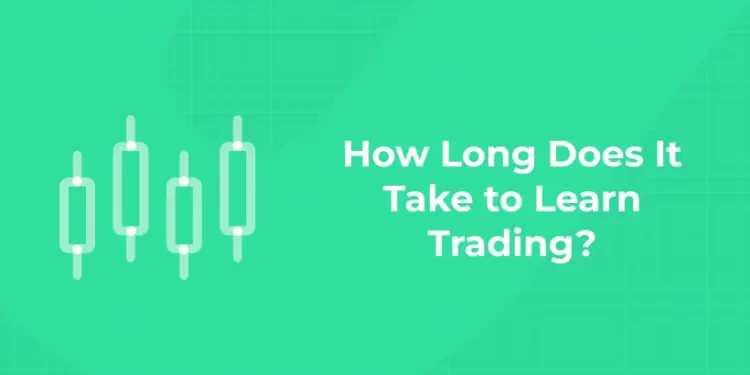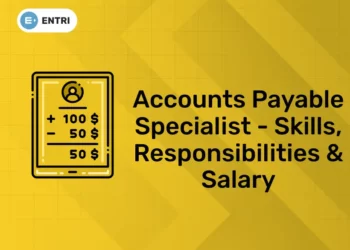Table of Contents
Learning trading is a journey that needs time, dedication, and a willingness to consistently learn and adapt. There is no definitive time frame for learning to trade stocks, but there are a number of variables that can affect how long it takes to become a skilled trader.
Let us now learn more about trading and how long it takes to learn trading in detail.
Master Stock Trading With Us – Enroll Here For A Free Demo!
What is trading?
Buying and selling financial products with the goal of turning a profit is known as trading. These instruments come in many forms, from different assets with fluctuating financial values that you can trade based on their path.
It’s possible that you’ve heard of funds, shares, and stocks. On the other hand, you can trade thousands of financial markets using a wide range of goods.
You can gain exposure to a wide range of markets, including the FTSE 100, the S&P 500, international currencies like the US dollar and Japanese yen, and commodities like cattle or lean hogs.
How Long Does It Really Take To Learn Trading?
Allow me to begin this piece with my response: It depends. Each trade will provide a unique opportunity for learning. This is contingent upon factors such as your investment horizon, trading objectives, and risk tolerance.
This is why I state that “it depends.” Trading can be as easy or as difficult as you like.
It depends, in my opinion, on these three elements:
- Which kind of asset do you trade? Forex, futures, stocks, or options?
- Do you trade using technical or fundamental analysis?
- What is the duration of your trading? Trading on the day? Trading on the move?
Tips to learn Trading
The trader’s purpose is simple: buy low and sell high. However, a solid study and market understanding are required for this conclusion. Learning to trade, being aware of the hazards, and making thoughtful judgements are crucial whether you’re thinking about making trading your full-time or part-time profession.
With the following advice and lessons, you can learn to trade and become an expert trader, enabling you to make wise decisions:
Start Small
It is best to start small if you want to trade but aren’t sure where to put your money. For the first few weeks, start with a pre-determined amount of money and concentrate on no more than two or three equities. This allows you to concentrate your money and gradually add more as you gain knowledge about how the trading market functions.
It is strongly recommended that you concentrate on a specific market area, industry, or firm even after you have learned to trade and are making purchases or sales. Ultimately, using this targeted strategy facilitates more logical decision-making than relying solely on trading suggestions or tips.
Set Realistic Goals
The majority of stock trading classes will instruct you that all trading and investing activities must be connected to a financial objective. This is crucial because it enables traders to assess their tolerance for risk and link it to their intended spending plan. You can put aside extra money after you learn to trade and begin selling.
Thus, make sure your objectives are reasonable and account for the possibility that things won’t always go according to plan. About 50% to 60% of deals are won by even the most seasoned traders, and for novices, this percentage may be much higher. When learning to trade, consider this risk as part of your objective so that you have a well-defined purchase strategy.
Investigate Before You Invest
Once your objectives are clear, begin investing in the stocks or commodities that suit your needs. Before making an investment, it is strongly advised to review the background, financial records, market statistics, and other information.
To improve your market analysis and trading skills, dedicate some time to reading and researching information. Make time to read up on stock market news, identify business prospects, and browse online resources and courses. You’ll be able to learn to trade and broaden your knowledge thanks to this.
Knowledge Is Power
Learn to trade by making the most of your knowledge of procedures and processes, in addition to knowing what to do. Get up-to-date stock market news and research subscriptions to identify opportunities that are worth taking advantage of. Learn to trade by taking into account the interest rates, market trends, and economic outlook and basing your decision on it. Trading is fast-paced, and even a slight delay can have a significant influence.
Allocate some time to acquire trading skills based on industry insights and information during open market hours. In addition, as soon as the market closes, begin strategizing your next course of action and become proficient in trading. Use trading charts and take measured risks to improve your chances of success.
If you are a fresh or looking to change careers, consider jobs that are closely related to trading, such as trade assistant jobs, marketing jobs, finance coordinator jobs, foreign exchange traders, investment consultants, financial consultants, and so on, to gain real-time industry insights that will help you in trading.
Learn When to Make a Trade
In an attempt to profit from the new rates, the majority of novices and investors place their bets as soon as the market opens. But it also causes price volatility, which is something that most experienced players are aware of and use to their advantage when timing trades.
Prior to making any purchases, learn how to trade and time your investments by observing market movements. While there may be substantial chances during rush hours, the middle of the day offers a chance to assess whether there has been any movement before the day closes. It is also generally less volatile. To become a skilled trader, practise making well-thought-out decisions and timing your market entry.
Always Have an Exit Strategy
In line with your goal, once you have achieved significant returns and completed the trading process, you must know when to exit. The exit plan will take into account both your objectives and the current state of the market. For example, if you were hoping to make 20% that day but the market is showing a downward trend, it’s time to pull out. To achieve the greatest outcomes, base your exit strategy on your financial objectives and the market analysis.
Setting expectations and a stop loss for each stock you invest in is important, in addition to trading goals. This will reduce your losses while allowing you to claim your winnings once the predetermined goal has been reached. Develop an exit strategy when trading to avoid waiting too long for wins that could never materialise.
Be Flexible With Your Plans
Any strategy that does not account for external forces that affect it is doomed to fail. Utilise best practices and strategies when trading to reduce risks and increase earnings. Traders should keep an eye on the market and make sure their entire strategy takes into account the most recent movements.
Always be ready for market volatility, and cut losses by exiting positions if the market is not moving in your favour. If the odds are not in your favour, fight the urge to sell and instead base your knowledge of the stock market on the most recent trend rather than your analysis.
| Top Courses for Mastering Trading Strategies | ||
| Stock Market Courses | Optional Trading training | Forex trading Training |
Is Trading Hard To Learn?
Learning to trade is often likened to learning to ride a bike. Once you grasp it, biking isn’t difficult. Becoming an expert rider requires practice. Similarly, trading requires time to master but is relatively simple to understand. This is why many traders fail—they don’t practice enough. Insufficient practice means avoiding mistakes, but it also means missing opportunities to learn from errors. Enrolling in a trading or stock market course can significantly aid in learning the ropes of trading
The majority of people want to start trading a system and have results by tomorrow. I’m sorry, but it doesn’t operate that way. You will eventually see the results if you put in the time.
Each trader has a unique trading approach. It will typically take less time to refine your strategy if you keep it basic. That doesn’t imply, though, that you shouldn’t invest the time!
FAQs
Q1. How long do trades take to learn?
Ans: Certain trades may require years of training, while others can just require a few months. An apprenticeship programme, for example, usually lasts for two to five years.
Q2. Is trading easy to learn?
Ans: Trading is difficult to perfect. It takes patience, ability, and self-control. Although many who attempt it lose money, you might be able to develop a potentially profitable plan with the aid of the tactics and ideas mentioned above.
Q3. How long does it take to become a trader?
Ans: When trading, it is crucial to have a plan. It will probably take six months to a year, if you are among the lucrative ones, to become consistent enough to get a steady income from the market through daily practice and trading.
Q4. What can you trade on?
Ans: A wide range of financial markets are available for trading, including those for shares, bonds, ETFs, themes, worldwide currencies (forex), commodities, indexes, and more.
Master Stock Trading With Us – Enroll Here For A Free Demo!










